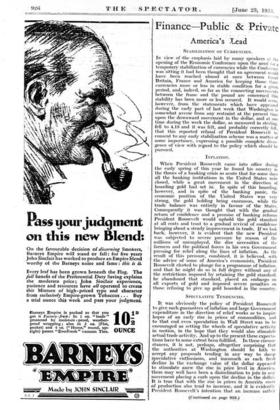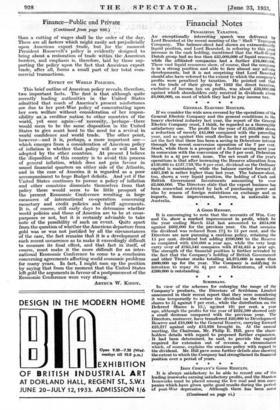Finance—Public & Private
America's Lead
STABILIZATION OF CURRENCIES.
Ibr view of. :the emphasis laid by many speakers at the opening of the EConomic Conference upon the need for a temporary stabilization of currencies while the Conference was sitting it had been thought that an agreement would have been reached • almost at - once between Great Britain, France and America for keeping those three currencies more or less in stable condition for . a given period, and, indeed, so far as the connecting movements between the franc and the pound are concerned this stability has been more or less secured. It would seem, however, from the statements which have appeared during the early part of last week that Washington is _somewhat averse from any restraint at the present time upon the downward movement in the dollar, and at one time during the week the dollar, as measured in sterling, fell to 4.19 and it was felt, and probably correctly felt, that this reported refusal _ of President Roosevelt to consent to any early stabilization scheme was a matter of some importance, expressing a possible complete diver- gence of view with regard to the policy which- should be pursued. _ INFLATION.
When President -Roosevelt came into office during the early spring of this year he found his country in the throes of a banking crisis so acute that for some days all the banking institutions in the United States were closed, while a great movement in the direction of hoarding gold had set in. In spite of this hoarding, however, and in spite of the banking panic, the economic position of the United States was very strong, the gold holding being enormous, while the trade balance was entirely in favour of the States. Consequently, it was thought that with the gradual return of confidence and a promise of banking reforms President Roosevelt would uphold the gold standard at all costs and trust to a gradual revival of confidence bringing about a steady 'improvement in trade. If we look back, however, it is evident that the new President was subjected to severe pressure by reason of the millions of unemployed; the dire necessities of the farmers and the political forces in his own Government pressing for relief altong the lines of inflation. As the result of this pressure, combined, it is believed, with the advice of some of America's economists, President Roosevelt elected to plunge for a programme of inflation. and that he might do so in full degree without any of the restrictions imposed by retaining the gold standard, he abandoned that standard, placed an embargo on all exports of gold and imposed severe penalties on those refusing to give up gold hoarded in the country.
SPECULATIVE TENDENCIES.
It was obviously the policy of President Roosevelt to give such guarantees of inflation and large Government expenditure in the direction of relief works as to inspire hopes of an early rise in prices of commodities, and to that end_ even speculation in Wall Street was to be encouraged as setting the wheels of speculative activity in motion, in the hope that they would also stimulate actual trade activity. And up to the present these expecta- tions 'have to some extent been fulfilled. In these circum- stances, it is not, perhaps, altogether surprising that the authorities at Washington should be loth to accept any proposals tending- in any way to damp speculative enthusiasm, and inasmuch as each fresh decline 'in the exchange value of the dollar appeared to stimulate anew the rise in price level in Anierica, there may well have been a disinclination to join- in any Movement placing tt curb upon-the decline in the dollar. It is true that with the rise in prices in America costs of prodnction also tend to increase; -and it is evidently President Roosevelt's intention, that an increase rather (Continued on page 928.)
Finance—Public and Private
(Continued from page 926.)
than a cutting of wages shall be the order of the day. These are all factors which might easily act prejudicially upon American export trade, but for the moment President Roosevelt's potcy is evidently designed to bring about- a restoration of trade within the American borders, and emphasis is, therefore, laid by those sup- porting the policy upon the fact that American export trade after all, forms a small part of her total com- mercial transactions.
EFFECT ON WORLD POLICIES.
This brief outline of American policy reveals, therefore, two important facts. The first is that although quite recently leading • authorities in the United States admitted that much of America's ,present misfortunes are due to her post-War policy of concentrating upon her own welfare without consideration of her respon- sibility as ,:,a creditor nation to other countries of the world, yet once again—of necessity, -perhapi—there would seem to be the same disposition in the United States to give scant heed to the need for a revival in world confidence and world trade. The other point, however—and it is, perhaps, a more important one— which emerges from a consideration of American policy of inflation is whether that policy will or will not be adopted by the other countries. At present I believe the -disposition of this country is, to avoid this process of general inflation, which does not gain favour in sound financial quarters on either side of the Atlantic, and in the case of America it is regarded as a poor accompaniment to huge Budget deficits. And yet if the United States continues to pursue a policy of inflation and other countries dissociate themselves from that policy there would seem to be little prospect of the present Economic Conference resulting in large measures of international co-operation concerning monetary and credit policies and tariff agreements. It is, of course, still early days to determine whether world policies and those of America are to be at cross- purposes or not, but it is certainly advisable to take note of the possibility of such an event. Quite apart from the question of whether the American departure from gold was or was not justified by all the circumstances of the case, the fact remains that it is a development of such recent occurrence as to make it exceedingly difficult to measure its final effect, and that fact in itself, of course, must make it the more difficult for an inter- national Economic Conference to come to a conclusion concerning agreements affecting world economic problems for many years. In fact, , I might sum up the position by saying that from the moment that the United States left gold the arguments in favour of a postponement of the Economic Conference were very strong.
ARTHUR W. KIDDY.









































 Previous page
Previous page